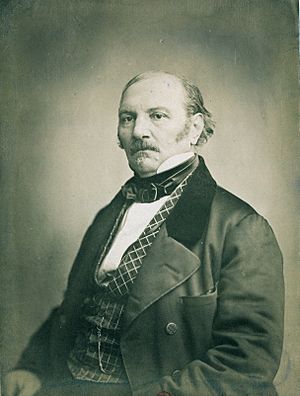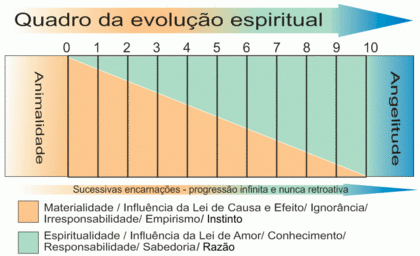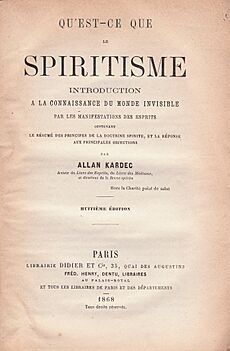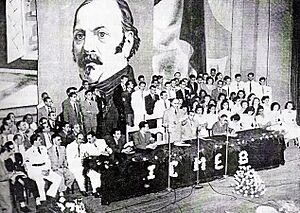Kardecist spiritism facts for kids
Spiritism or Kardecism is a belief system that started in France in the mid-1800s. It was created by a writer and teacher named Hippolyte Léon Denizard Rivail, also known as Allan Kardec. Spiritism teaches that our spirits come back to live in new bodies after we die, a process called reincarnation. It also believes that we can communicate with spirits.
Kardec came up with the word spiritism in 1857. He said it was a teaching based on the idea that spirits exist, can show themselves, and can teach us things. Kardec thought Spiritism brought together ideas from science, philosophy, and religion. He became interested after seeing "table-turning" (where tables seemed to move on their own), and he wondered how they could give answers without a brain. He believed it was the spirits of people who had lived on Earth.
Spiritism's main ideas come from five books written by Kardec between 1857 and 1868. These books are The Spirits' Book, The Mediums' Book, The Gospel According to Spiritism, Heaven and Hell, and The Genesis. People who follow Spiritism believe in one God, that they can talk to spirits through people called mediums, and that reincarnation helps spirits grow and learn.
Spiritism is practiced in 36 countries and has over 13 million followers. It is most popular in Brazil, where about 3.8 million people are Spiritists. Spiritists are also known for helping others and doing good deeds.
Contents
What is Spiritism?
The word spiritisme was created by Allan Kardec to describe the ideas he put together in The Spirits' Book (1857).
To talk about new things, we need new words. This makes language clear and avoids confusion. Words like spiritual and spiritualism already have meanings. Giving them another meaning for the doctrine of Spirits would just cause more confusion. (...) Someone who believes they have something more than just matter inside them is a spiritualist. But this doesn't mean they believe spirits exist or talk to the visible world. Instead of using 'spiritual' or 'spiritualism' for our beliefs, we use 'Spiritist' and 'Spiritism'. These words remind us of their origin and meaning, and they are easy to understand, leaving 'spiritualism' with its own meaning.
Today, spiritism often refers to different religious and philosophical ideas that believe spirits survive after death and that we can talk to them.
Some followers prefer to use only the term Spiritism for Kardec's teachings, saying there are no different types of Spiritism. They believe Spiritism is unique and that calling it "Kardecist Spiritism" is unnecessary. They simply call themselves Spiritists.
Is Spiritism a Science?
Some people, like Alexander Moreira de Almeida, have tried to show that Kardec's way of looking at things was very new. However, most scientists today see parapsychology (the study of things like mediumship and reincarnation) as a pseudoscience. This means they don't believe the strange events that Spiritism talks about, like spirits talking through mediums or tables moving on their own, are real or proven by science.
Is Spiritism Christian?
Kardec taught that "the teaching of the Spirits is very Christian." Spiritist writers also say that reincarnation was part of early Christianity. However, many scholars disagree. They point out that Spiritism does not believe in some main Christian ideas, like the Trinity (God as Father, Son, and Holy Spirit), the physical resurrection of Jesus, or that the Bible is completely inspired by God. Because of these differences, many experts see Spiritism as a new form of Christianity. Spiritists, however, believe it is Christian because it teaches people to love others, just like Jesus did.
History of Spiritism
Early Beliefs in Spirits

Spiritists believe that talking to spirits has always happened. They point to stories in the Bible, like Moses telling people not to "consult the dead," which suggests people believed it was possible. They also mention Saul talking to the Witch of Endor, and Jesus talking to Moses and Elijah during the Transfiguration of Jesus.
Ancient thinkers like Plato also wrote about a "daimon" or "genius" that guided Socrates.
Many Spiritists mark March 31, 1848, as the start of modern spirit communication. This was when the Fox sisters in the US reportedly began hearing strange knocks, which led many people to investigate these events.
Allan Kardec's Work

In the 1800s, many strange events involving spirits were reported in the United States and Europe. These included noises, furniture moving, and objects floating, like "table-turning". The Fox sisters' case in the US was very famous in the late 1840s.
A true Spiritist is not just someone who believes in spirit messages, but someone who uses the teachings from spirits to improve themselves and be better to others.
Kardec was a student of Pestalozzi, a famous educator. He wanted to help people understand spirituality at a time when science was growing fast and religions seemed to be losing followers. Kardec believed he had found a new way to see reality that would bring science and religion together. He studied many reports of spirit events across Europe and the US. He then organized this information to create a clear set of teachings and practices.
Let us show them that, thanks to the teachings of those they call demons, we understand the wonderful lessons of the Gospel. These lessons are all about loving God and our neighbors, and showing kindness to everyone. Let us welcome all people, no matter their religion, race, or background. Let them know that our God, the God of the Spiritists, is not a mean and angry ruler who punishes mistakes forever. Instead, God is a kind and loving father who cares for his children, helping them grow through challenges that clean away their flaws.
Table-Turning and Its Explanations
When Kardec first saw table-turning, tables would lift and knock to answer "yes" or "no" to questions.
Even though people believed spirits were moving the tables, scientist Michael Faraday showed in 1853 that these movements were caused by the ideomotor effect. This means people were unconsciously moving the tables themselves. The ideomotor effect also explains movements seen with ouija boards and the "cup game."
Kardec thought that the accuracy of the answers from the tables could not be just by chance. He questioned if muscles alone could cause all the movements and messages. When asked, the mysterious "being" that responded said it was a spirit. Over time, table-turning became less popular.
The famous writer Victor Hugo also believed he contacted spirits through table-turning sessions. He even called for science to take these events seriously.
Spiritist Beliefs
Main Principles

Spiritism began on April 18, 1857, with the release of The Spirits' Book. It was built on supposed conversations with spirits who shared ideas about science, religion, and philosophy, all based on Christian morals. A key idea in Spiritism is the importance of charity, which means being kind to everyone, forgiving others' mistakes, and being understanding. The motto is: Outside of charity, there is no salvation.
Spiritism tries to connect science, philosophy, and religion to better understand reality. Kardec famously said: "True faith is only that which can face reason directly in every age."
Core Ideas
Spiritism generally teaches the following:
- God: There is one God, who is the highest intelligence and creator of everything. Spiritists do not believe in the Holy Trinity.
- Universe: God created the universe, including all living things (like Jesus) and non-living things, all of which are meant to grow and improve.
- Spirits: Spirits exist forever. They are intelligent beings created by God. They connect to our bodies through a "semimaterial" link called the perispirit.
- Reincarnation: Spirits return to live in new bodies many times. This is how they learn and improve themselves. Spiritists do not believe in metempsychosis (spirits returning as animals).
- Equality: All spirits start out simple and innocent. They all have the same chance to become perfect and choose between good and evil.
- Communication with Spirits: Living people can talk to spirits through mediums, who have special abilities. This can happen through automatic writing (psychography), where a medium writes messages from spirits.
- Cause and Effect: Our actions today shape our future. If you do good, you will experience good. If you do bad, you will experience bad.
- Many Worlds: Earth is not the only planet with intelligent life. Spirits can reincarnate on other planets.
- Jesus: Jesus is a guide and role model for all people. Spiritists believe that the Christian teachings in the gospels are the best moral guide for humanity.
- Charity: As mentioned, charity means being kind to everyone, understanding others' flaws, and forgiving those who wrong you.
Other important points:
- Responsibility: Each spirit is always responsible for its actions.
- No Priests: Spiritism does not have a system of priests or religious leaders.
- Giving Freely: Spiritist activities are always free. People should not ask for money for good deeds.
- No Rituals: Spiritism does not have formal rituals like baptism, special ceremonies for marriage, or exorcisms.
- Respect for All: Spiritism encourages respect for all religions and beliefs.
- Reasoned Faith: Spiritists believe in faith that makes sense and can be understood with logic, not blind faith.
Symbolism
Spiritism does not have an official symbol. However, the image of a vine branch in The Spirits' Book is seen as a symbol of the connection between the spirit and the human body.
You should put the vine branch we drew for you at the beginning of the book. It contains all the physical ideas that best show the body and the spirit. The body is the vine branch, the spirit is the liquid, and the soul or spirit connected to matter is the grape. Humans improve the spirit through work, and you know that the Spirit gains knowledge only through the body's work.
Important Books
Main Books
Here are some of the main books by Allan Kardec:
- The Spirits' Book (1857): This book explains the main ideas of Spiritism.
- The Mediums' Book (1861): This book talks about how to investigate and understand spirit communication. It explains how spirits might interact with the physical world.
- The Gospel According to Spiritism (1864): This book looks at the Christian gospels from a Spiritist point of view, focusing on how to apply Christian moral teachings like prayer and charity.
- Heaven and Hell (1865): This book discusses ideas about life after death, heaven, hell, and how divine justice works. It also includes stories from spirits about their experiences after death.
- The Genesis According to Spiritism (1868): This book explores big questions like how the universe was created, how spirits came to be, and what miracles really are, all from a Spiritist perspective.
Other Works
- What Is Spiritism? (1859): This book is a simple introduction to Spiritism.
- Spiritist Review (Revue Spirite): This magazine was started by Kardec and is still published today. It covers topics related to Spiritism.
- Posthumous Works (1890): This book was published after Kardec's death. It contains his unreleased writings and notes that help explain how Spiritism was created.
Spiritism and Society
Science and Medicine
Scientific Study of Spirit Phenomena
Scientists have studied mediumship and other "spirit phenomena" for over a century. While some scientists have claimed to find evidence for these phenomena, the existence of spirits is not scientifically proven.
Many famous scientists and thinkers, including Alfred Russel Wallace, Carl Jung, Marie Curie, and William James, have investigated mediumship and its connection to the mind and body.
Spiritism and Healthcare

Spiritism has a strong link with medicine. Many Spiritist books discuss health, and there are international groups for Spiritist doctors. Spiritism also supports charities and healthcare places, including hospitals and centers that promote psychiatry and homeopathy.
Dr. Adolfo Bezerra de Menezes, a Spiritist doctor, wrote a book called Insanity from a New Perspective. He explored how mental health issues might relate to Spiritism and suggested new ways to treat them.
Today, psychiatrist Alexander Moreira-Almeida studies the connection between health and spiritual experiences, especially mediumship.
Spiritism and Other Religions
Spiritists sometimes disagree on whether Spiritism is a religion. It is often described as having three parts: science, philosophy, and religion. Kardec himself said that Spiritism is a "science of observation and a philosophical doctrine." But he also clearly stated: "From a religious point of view, Spiritism is based on the main truths of all religions: God, the soul, immortality, rewards and punishments after death." He also said that Spiritism helps prove that the soul exists and lives on after the body dies.
Kardec explained that Spiritism is a religion "in the philosophical sense" because it "creates bonds of brotherhood and shared ideas, not just by agreement, but on stronger foundations: the very laws of Nature."
Spiritism respects all religions and beliefs. It values any effort to do good and aims for peace among all people. However, it does not agree with some main beliefs of other religions, especially some Christian ideas like the divinity of Christ, the Holy Trinity, or that salvation comes only from grace.
Spiritism and Christianity

Spiritism follows Christian moral teachings, even though its ideas about God are different. Spiritists believe Jesus Christ was the most advanced spirit to ever live on Earth.
Spiritists see themselves as Christians because they follow Jesus's moral teachings. Allan Kardec believed that Christian morality, without its specific religious rules, was the closest thing humans had to a divine and logical code of ethics. Spiritists argue that many Christian rules were developed by the Catholic Church over time and are not necessary to be a Christian. The Spirits' Book also states that Jesus is the best moral example for humanity, though Spiritism does not believe he was God himself.
Sermon on the Mount
The Beatitudes are nine important teachings Jesus gave in the Sermon on the Mount in the New Testament. Spiritism sees these teachings as very important.
- "Blessed are the poor in spirit, for theirs is the kingdom of heaven." Spiritism teaches that Jesus is promising heaven to those who are simple and humble.
- "Blessed are those who mourn, for they will be comforted." Spiritism believes that the comfort Jesus promises to those who suffer on Earth will happen in the afterlife. Believing in the future helps spirits be patient and calm during life's difficulties. Spiritism explains that life's challenges can come from this life or from past lives, where the spirit is learning from past mistakes.
- "Blessed are the pure in heart, for they will see God." Having a pure heart means being simple and humble, without pride or selfishness. Spiritism explains that Jesus used children as an example of purity (Mark 10:13-15) because a child's spirit, not yet showing bad tendencies, represents innocence. However, a spirit's past actions affect its behavior as it grows.
- "Blessed are the meek, for they will inherit the earth." Spiritism teaches that Jesus made gentleness, patience, and kindness a rule for life.
- "Blessed are the merciful, for they will be shown mercy." Mercy means forgiving others. Spiritism believes that the best way to please God is to make peace with those you have disagreements with (Matthew 5:23-24).
Spiritism summarizes all Christian morality with this idea:
Outside of charity, there is no salvation.
Spiritist Organizations
Brazilian Spiritist Federation

The Brazilian Spiritist Federation (FEB) was founded on January 2, 1884, in Rio de Janeiro. It is a group that studies, practices, and spreads Spiritism based on Allan Kardec's books and the Christian Gospels. It also does educational, cultural, and charity work.
International Spiritist Council
The International Spiritist Council (ISC) was formed on November 28, 1992, in Madrid, Spain. It brings together Spiritist groups from 35 countries. Its goals are to unite Spiritist groups worldwide, promote the study and spread of Spiritism (its scientific, philosophical, and religious parts), and encourage charity as taught by Spiritism. The ISC organizes the World Spiritist Congress every three years.
Pan-American Spiritist Confederation
The Pan-American Spiritist Confederation (CEPA) was founded on October 5, 1946, in Argentina. It mainly connects Spiritists in Latin America. CEPA has groups in many countries and believes Spiritism should be separate from specific religious practices. It holds events like the Forum of Free Thinking Spiritists.
Where Spiritism is Found

From 1857 to 1869 (when Kardec died), Spiritism grew to 7 million followers. By 2005, there were about 13 million Spiritists worldwide. In 2010, Brazil had about 3.8 million Spiritists, making it the country with the most followers. The International Spiritist Council has 36 member countries.
Spiritism in Brazil


Spiritism arrived in Brazil around 1860 with the first copies of The Spirits' Book. It became very popular in Brazil thanks to people like Bezerra de Menezes and Chico Xavier. Brazil has the largest number of Spiritists in the world.
In the 1800s, practicing Spiritism was even against the law in Brazil, with people facing up to 6 months in prison. It only became officially allowed in 1940. The Brazilian Spiritist Federation (FEB) connects about ten thousand Spiritist groups across Brazil. There are also many Spiritist associations for different jobs, like doctors, psychologists, and artists.
According to the 2010 Brazilian Census, Brazil had about 3.8 million Spiritists. Cities with many Spiritists include Florianópolis, Porto Alegre, and Rio de Janeiro. The census considers "Kardecism" and "Spiritism" to be the same.
Spiritists in Brazil tend to have higher incomes and more education than other religious groups. They are very involved in charity work, running orphanages, schools, and other aid organizations. Allan Kardec is very well-known in Brazil; his books have sold over 25 million copies there. Spiritist books are very popular in Brazil, often topping bestseller lists. From 2000 to 2010, the number of Spiritists in Brazil grew by over 60%.
Spiritism in Cuba
After religion became legal again in Cuba, Spiritism saw a comeback. It had been present there since the 1800s. In 2011, Cuba had 400 Spiritist centers, with 200 more being registered. This makes Cuba the second most Spiritist country in terms of the number of centers.
Spiritism in Spain
In Spain, a pioneer of Spiritism was Luis Francisco Benítez de Lugo y Benítez de Lugo. He even tried to get Spiritism taught officially in 1873.
Spiritism in Mexico
Spiritism reached Mexico in the 1850s and 1860s, attracting educated people with its modern ideas. General Refugio Indalecio González translated Kardec's works into Spanish. Spiritist magazines also circulated. In 1875, there was a big debate about Spiritism in Mexico City.
Popular Spiritism also grew, mixing with local beliefs and practices. A spiritual healer named Teresa Urrea became famous. The writer Laureana Wright became a Spiritist in 1889 to promote open discussion and women's equality. Spiritist groups formed in many places. In the early 1900s, Spiritism gained more attention when Francisco Madero, who later became president of Mexico, promoted it and even published a book inspired by supposed spirit messages that helped start the Mexican Revolution.
See also
 In Spanish: Espiritismo para niños
In Spanish: Espiritismo para niños
- Automatic writing
- Dowsing
- Mediumship
- Ouija
- Spiritualism
- List of Spiritualist organizations, spiritualists (Fox sister followers) not spiritists (Kardec followers)
- Chico Xavier
 | Lonnie Johnson |
 | Granville Woods |
 | Lewis Howard Latimer |
 | James West |







